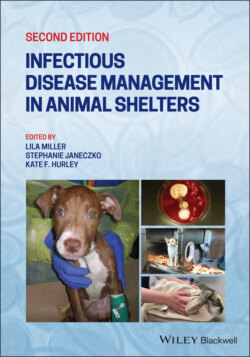Читать книгу Infectious Disease Management in Animal Shelters - Группа авторов - Страница 114
4.3.4.1.3 Tertiary Tests
ОглавлениеSerum neutralization testing or, when in reference to viruses, virus neutralization (VN) is used to estimate the ability of antibodies within a test sample to disrupt (i.e. neutralize) the biological activity of an antigen. Such activity can include hemolysis of red blood cells, lysis of nucleated cells, and disease or death in animals. In these tests, serial dilution of the test serum is exposed to a constant amount of antigen (i.e. live virus). Antibodies within the test serum bind to the antigen, blocking critical attachment sites thus preventing them from infecting live cells. The reciprocal of the highest serum dilution that prevents lysis of 50% of cells, infection in 50% of tissue cultures or infection in 50% of live animals represents the VN titer for that sample. In addition to its use for measuring antibodies, VN can also be used to identify specific viruses (Tizard 2013). VN typically has higher sensitivity compared to secondary binding tests such as HI and CF and is commonly employed to measure antibodies against adenoviruses, caliciviruses, herpesviruses, and parvoviruses. VN is considered the gold standard titer testing method for canine distemper virus (Ford 2013).
